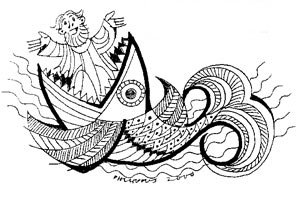

ATLANTIC LIFE COMMUNITY
Toward a statement of purpose: 1976
If, as Sartre said, the crime of our age is making the concrete -- life and death issues — abstract, the urgent work of our age is to make the abstract concrete. In our respective communities we need to foster the reflection and dialogue that will enable us to develop concrete actions/lives, concrete translations of the results of nuclear suicide.
The primary focus of the Atlantic Life Community is the problem of nuclear proliferation. We choose this issue as a community because it is a vital problem for this century; because it is an issue that few groups such as ours are working on; and because we bring to the issue a specific commitment to resistance actions and civil disobedience. But while the nuclear issue is our primary focus , it is certainly not our exclusive focus, since many of the communities making up the ALC are committed to other kinds of peace and justice work as well . We also recognize that, although we may attack the problem in very different ways, we are just a small part of a much larger world movement toward peace and human dignity.
As a network of communities on the East Coast, together with individuals who associate with those communities, we commit ourselves to support and participate in specific actions planned by local communities in their own areas. To further our need for increased communication, we suggest a monthly newsletter which would briefly give news of communities and individuals who are part of us--planned actions, calls for action, evaluations and reports of past actions, as well as news of a more personal nature of individuals and communities.
There has been a rather long and very deep association between many of the people who make up the Atlantic Life Community. The ALC exists because we do and because our visions are given life in action. We share a strong spiritual bond which we do not attempt to define in any traditional way, but which serves as an inspiration and gives us a sense of purpose and a sense of hope in confronting the forces of death that surround us and that are within us. We seek together to resist the "Tr9idents within ourselves"--Tridents of sexism, competitiveness, and the desire for domination over others--even as we resist the injustices of our society.
In one of his essays--"The Day Noah Missed the Boat"--Dan Berrigan envisioned the aged Noah in a death-bed dialogue with one of his offspring. The latter was angry and questioning of God's behavior in destroying life on earth. He was questioning of Noah's participation. "What made your children so much better than all the others?" he queried. Noah did his defense of God; his son remained unconvinced. Noah was about to die. The son came again. No longer quarrelsome he has two requests: to see that bit of live green, which, while we have never quite seen it, we can never quite forget: and to see that dove--because we don't need saviors so much as we need signs.
Our society does not need saviors. Christians among us believe it is already saved. But all agree that it needs signs--signs of life, sings of hope, signs that point to the real dangers threatening human life.
We commit ourselves to the developing of such signs through our lives and actions...